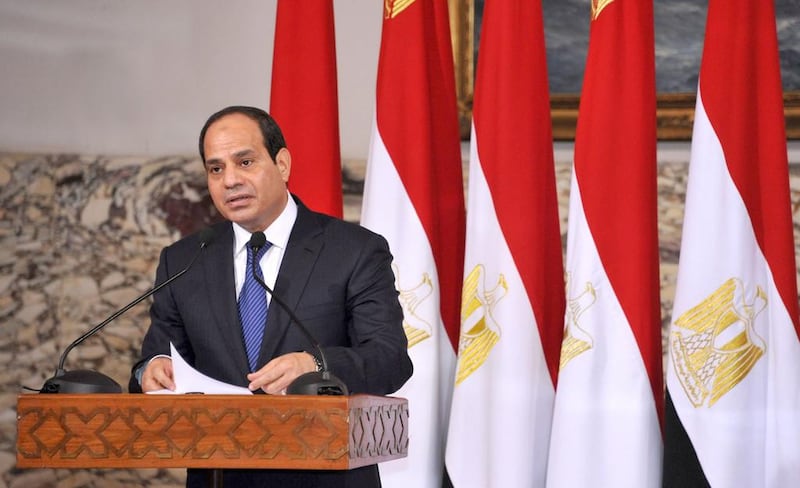Gaza has been under siege for a lot longer than the past couple of weeks. Its population has been suffering from a long-term Israeli blockade, as well as the closing of the border with Egypt. The Egyptian government knows it is vitally important for Cairo to play a role in the cessation of hostilities between Israel and the Palestinians – but there remain deep difficulties in achieving that goal.
For Egypt to fulfil that function, it effectively requires a direct relationship with the major parties involved in the conflict: the Israeli government, the Palestinian Authority and Hamas.
Critically, the relationship with the latter is weak, even though there has been some contact with Mousa Abu Marzouk, Hamas’s representative in Cairo. But, at the very least, it is an awkward relationship. Hamas is an affiliate of the Muslim Brotherhood, an organisation that Cairo has designated as a terrorist group in Egypt. Some accuse Hamas of playing a disruptive role in Egyptian political affairs over the past three years. On top of that, there is also widespread exasperation that Hamas rejected Egypt’s ceasefire proposal last week. Poor relations between Hamas and Cairo, therefore, make it difficult for effective engagement between the two parties.
From Egypt’s perspective, it is vital to play a key role in the conflict’s resolution. Gaza borders the Sinai Peninsula and security analysts have long argued that there are exchanges of personnel and arms between radical groups in both territories.
The more unstable either area becomes, the worse it is for both. From Egypt’s perspective, a chaotic, bombed and suffering Gaza has direct repercussions on radicals in Sinai. It reinforces a genuine grievance, which then plays into recruitment strategies for radicals and that affects the strength of militant groups in Sinai.
On the international diplomatic level, the barrage against Gaza produces another issue for Egypt. International public opinion demands that a ceasefire be negotiated – and if Egypt is not at the forefront of those negotiations, other countries will fill that void.
Those parties are not necessarily going to be strong allies of Cairo. Indeed, in this scenario, Turkey, in particular (and Qatar, to a lesser extent), have tried to slip into the void. They’ve been unsuccessful so far, but that situation will not continue indefinitely.
If Egypt does not play a key role in any future Palestinian-Israeli negotiations, then there are two immediate outcomes for Cairo: a drop in Egypt’s international political capital and the corresponding increase of capital for those who are hostile to it.
Egypt urgently needs to play a leading role. Its reputation internationally has been badly knocked by recurring criticism of Cairo’s human rights record by international media outlets and organisations like the UN and the EU.
Finally, Egyptian public opinion does have a function to play. Opinion on Hamas is split in Egypt. Supporters of the Muslim Brotherhood are obviously receptive to Hamas, but the majority of the population harbours little goodwill towards Hamas or its affiliates.
What is clear is the overwhelming public sympathy towards the Palestinian people, irrespective of whether Hamas governs Gaza or not.
Opposition to the Israeli occupation has been long-standing in Egypt. That sentiment has hardened since the Israeli army began its brutal military onslaught, which has resulted in more than 700 Palestinian deaths, most of whom were civilians, according to the United Nations.
Egypt’s authorities are sensitive to the public mood. Any perception that Cairo is not standing side by side with Gaza would be problematic for the government, which has staked some of its popularity on cutting a slew of economic subsidies.
Cairo’s most direct route seems clear: opening up more lines of communication with Hamas, in conjunction with the Palestinian Authority, would ensure negotiations moved more swiftly.
The Palestinian Authority has already publicly agreed to Hamas’s demand that any ceasefire agreement include an end to the blockade of Gaza. Egypt, meanwhile, has yet another political motive – in addition to the humanitarian one – to open the border with Gaza. That would strengthen the government’s political capital in Gaza, as well as domestically.
The alternative, of course, is for Egypt simply to stick to its original ceasefire proposal. But that is not realistic: that proposal’s traction is already diminishing and the path to resolution in Gaza is only likely to become more difficult to navigate.
In the meantime, Gaza burns, Palestinian civilians perish – and Egypt’s political standing is threatened.
Dr HA Hellyer is an associate fellow at the Royal United Services Institute in London, and the Brookings Institution in Washington DC
On Twitter: @hahellyer





